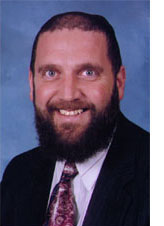 SAN DIEGO–“Remember the Shabbos day and keep it holy.”
SAN DIEGO–“Remember the Shabbos day and keep it holy.”
The Chofetz Chaim writes that Shabbos is a sign for the Jewish people. When a store has a sign out front, you know it’s in business. When we have Shabbos, we are ‘in business.’ Faithful observance of Shabbos is part of what makes our people eternal, as the following true story submitted by Evi Reznck, Atlanta, Georgia, illustrates:
Back in the mid nineties a Jewish advertising executive in New York came up with an idea. What if the New York Times – considered the world’s most prestigious newspaper – listed the weekly Shabbat candle lighting time each week. Sure someone would have to pay for the space. But imagine the Jewish awareness and pride that might result from such a prominent mention of the Jewish Shabbat each week.
He got in touch with a Jewish philanthropist and sold him on the idea. It cost almost two thousand dollars a week. But he did it. And for the next five years, each Friday, Jews around
the world would see: ‘Jewish Women: Shabbat candle lighting time this Friday is ___’. Eventually the philanthropist had to cut back on a number of his projects. And in June 1999, the little Shabbat notice and stopped appearing in the Friday Times. From that week on it never appeared again.
Except once. On January 1, 2000, the NY Times ran a Millennium edition. It was a special issue that featured three front pages.
One had the news from January 1, 1900. The second was the actual news of the day, January 1, 2000. And then they had a third front page.
Projecting future events of January 1, 2100. This fictional page included things like a welcome to the fifty-first state: Cuba . As well as a discussion as to whether robots should be
allowed to vote. And so on. And in addition to the fascinating articles, there was one more thing. Down on the bottom of the Year 2100 front page, was the candle lighting time in
New York for January 1, 2100. Nobody paid for it. It was just put in by the Times. The production manager of the New York Times – an Irish Catholic – was asked about it. His answer was right on the mark. “We don’t know what will happen in the year 2100. It is impossible to predict the future. But of one thing you can be certain. That in the year 2100 Jewish women will be lighting Shabbos candles.
This non-Jewish production manager sensed a profound truth. Thus is the power of Jewish ritual. Thus is the eternity of our people.
~
“Honor thy father and thy mother.”
This commandment demands of us to be the type of parents that our children can honor and cherish. This takes much wisdom and thought, as the following words written by Rabbi
Yakov Horowitz, submitted by Getzal Segal, illustrate:
The GPS system in our automobiles, nonchalantly responds when we make a mistake or don’t follow its instructions. The same calm voice that directed us in the first place comes
back on, simply says, “Recalculating,” and helps get us back on track.
Now; imagine how we would feel and respond if the GPS was programmed to progressively inject a harsher tone of voice and raise the volume each time we missed a turn in
unfamiliar territory.
Would it help or hinder us if instead of “Recalculating,” we heard things like, “Would you PLEASE listen next time?” or “Don’t you know anything at all about driving?”
The affection that we all feel regarding our children is most certainly a positive component of our relationship with them. However, precisely because we love them so much, we
are often too passionate to calmly help them grow and learn from the inevitable mistakes they make.
Our chazal (sages) teach us that there are profound lessons to be learned from all new developments in our world. Perhaps we ought to take a page from the makers of GPS and
do our very best to gently, privately and constructively help our kids “Recalculate” the next time they take a wrong turn or two.
Dedicated by Dr. Scott A. Magnes in honor of his parents Dr. & Mrs. G. D. Magnes.
*
Rabbi Lederman is spiritual leader of Congregation Kehillas Torah in San Diego